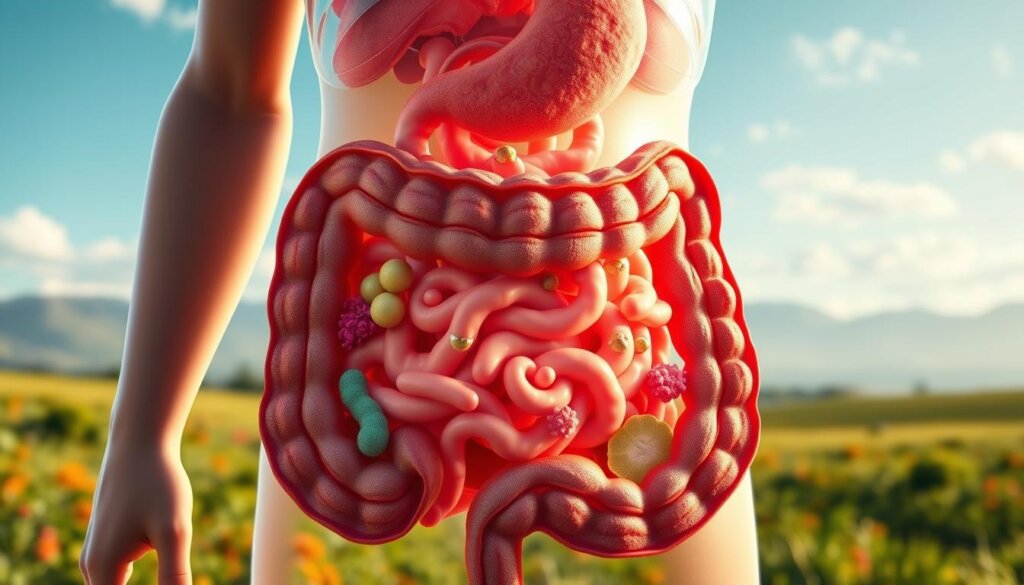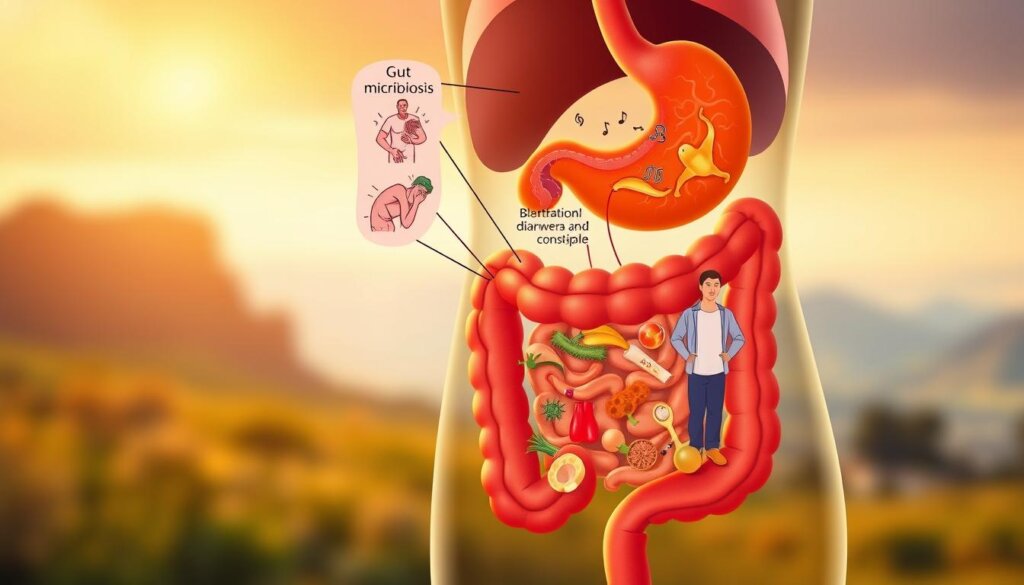Did you know the trillions of microorganisms in your digestive system form a biological powerhouse weighing 2-5 pounds? That’s roughly the same as your brain! These bacteria, viruses, and fungi outnumber human cells in your body, creating a living ecosystem that impacts everything from immunity to mood.
This complex network, often called the “second brain,” works nonstop to digest food, fight pathogens, and even produce neurotransmitters. Research shows imbalances here can affect energy levels, skin clarity, and mental focus. Nearly 70% of immune cells reside in this system, making it a frontline defender against illnesses.
At Wellness Group, our team helps Malaysians nurture this vital resource through personalized guidance. Available Monday-Friday 9:30 am-6:30 pm and weekends 10 am-5 pm via WhatsApp, we simplify science into actionable steps. Whether you’re exploring natural daily detox routines or dietary adjustments, understanding your inner ecosystem is the first step toward lasting vitality.
Key Takeaways
- The gut microbiome weighs 2-5 pounds and contains 40 trillion microorganisms
- This system influences immunity, digestion, and mental well-being
- Over 70% of immune cells develop in gut-associated tissues
- Microbial balance affects nutrient absorption and inflammation levels
- Professional guidance helps maintain optimal microbial diversity
Introduction to Gut Health
A balanced internal ecosystem acts as the foundation for vitality. This intricate network spans from your stomach to the large intestine, hosting over 1,000 bacterial species. These microorganisms form partnerships that shape how your body operates daily.
Defining Your Inner Ecosystem

Click to LEARN MORE
The gastrointestinal tract isn’t just about processing meals. It’s a living workspace where beneficial bacteria break down food, extract nutrients, and crowd out harmful invaders. Most microbial activity happens in the cecum – a specialized pouch within the large intestine.
Diversity matters here. When different bacterial strains coexist harmoniously, they support efficient digestion and robust immunity. Research shows varied microbial populations help regulate inflammation and even influence neurotransmitter production.
Connecting to Whole-Body Wellness
Your microbial community impacts more than just stomach comfort. A thriving microbiome enhances nutrient absorption, turning meals into usable energy. It also communicates with immune cells, helping them distinguish between threats and harmless substances.
Imbalances often manifest subtly – think fatigue or frequent sniffles. By nurturing this delicate system through diet and lifestyle choices, individuals can boost their resilience against modern stressors. Professional guidance helps tailor these strategies for lasting results.
What is gut health important for?
Your body’s microbial residents work overtime to protect and nourish every system. These microscopic allies break down food, extract vitamins, and create protective compounds that travel through your bloodstream. Nearly three-quarters of immune defenses develop in intestinal tissues, making this area critical for fighting infections.

Proper nutrient absorption relies on a well-functioning digestive ecosystem. When microbial diversity thrives, it enhances mineral uptake like iron and calcium – essential for energy and bone strength. Studies show balanced bacterial populations improve metabolic efficiency by 12-15% compared to compromised systems.
| Body System | Role of Gut Bacteria | Impact |
|---|---|---|
| Immune Defense | Trains white blood cells | Reduces allergy risks |
| Brain Function | Produces serotonin | Supports mood stability |
| Cardiovascular | Regulates cholesterol | Maintains blood pressure |
The intestinal lining acts as a selective barrier, blocking toxins while permitting nutrients. Certain strains even generate short-chain fatty acids that strengthen this protective wall. Including probiotic-rich foods helps maintain this crucial filtration system.
Mental clarity and emotional resilience connect directly to digestive wellness. Microbial communities produce neurotransmitters affecting focus and stress responses. Malaysians seeking personalized strategies can consult Wellness Group’s experts for tailored nutrition plans.
The Significance of the Gut Microbiome
Deep within your intestines, a bustling community of microbes shapes your overall well-being. This microscopic workforce converts food into fuel, manufactures vitamins, and communicates with your immune system and brain. Their activities form the backbone of daily biological processes that keep you energized and resilient.
Key Functions and Roles
Beneficial bacteria break down fiber into short-chain fatty acids – compounds that strengthen intestinal walls and reduce inflammation. These acids also help regulate blood sugar and cholesterol levels, lowering risks for chronic conditions. Your microbiome even produces vitamin K and B vitamins essential for energy metabolism and blood clotting.
These microbial allies defend against harmful invaders by occupying space and releasing natural antibiotics. They train immune cells to recognize threats while tolerating harmless substances, preventing unnecessary inflammation. This delicate balance supports efficient nutrient absorption and metabolic efficiency.
Impact on Immune and Mental Health
Over 70% of immune cells develop alongside gut bacteria, creating a defense network that starts in your digestive tract. Disruptions in microbial diversity can weaken this barrier, increasing susceptibility to infections and allergies.
The gut-brain connection operates through the vagus nerve and neurotransmitter production. Microbial communities generate 90% of the body’s serotonin – a mood-regulating chemical. Studies link balanced microbiome populations to reduced anxiety and sharper cognitive function. For those seeking to support their microbial balance, incorporating targeted probiotics can be an effective strategy.
Stress responses and hormone regulation also tie into this complex system. By nurturing microbial diversity through diet and lifestyle, individuals can influence both physical vitality and emotional resilience.
Exploring Dysbiosis and Common Gut Issues

Click to LEARN MORE
Your digestive system’s microbial harmony can easily tip into chaos. When harmful bacteria outnumber beneficial strains, the resulting imbalance – called dysbiosis – triggers a cascade of physical distress signals. Left unaddressed, these disruptions may evolve into chronic conditions affecting multiple body systems.

Recognizing Symptoms and Imbalances
Early signs often appear as persistent bloating after meals or unexplained nausea. Some people experience alternating constipation and diarrhea – classic markers of microbial instability. Other red flags include frequent heartburn, excessive gas, and abdominal cramping that interferes with daily activities.
Research shows these symptoms frequently precede more serious diseases. A 2023 study found 68% of patients with undiagnosed digestive issues later developed identifiable gut disorders. Tracking patterns helps distinguish temporary discomfort from chronic imbalances needing professional care.
Links to Inflammatory Conditions
Chronic dysbiosis often correlates with inflammatory bowel disease development. Conditions like Crohn’s disease and ulcerative colitis involve immune system attacks on intestinal tissue. Microbial imbalances may trigger these reactions by weakening protective gut barriers.
Irritable bowel syndrome affects 11% of Malaysians, with symptoms worsening during stress or dietary changes. Unlike inflammatory bowel disease, IBS doesn’t cause intestinal damage but significantly impacts quality of life. Both conditions highlight the microbiome’s role in regulating inflammation and pain responses.
Environmental factors like processed foods and antibiotics often accelerate microbial imbalances. Addressing these triggers through dietary changes and stress management helps restore equilibrium before diseases become entrenched.
Diet, Prebiotics, and Probiotics for a Healthy Gut
Your plate holds the blueprint for microbial diversity. Strategic food choices directly influence which bacterial strains thrive in your digestive tract. Combining probiotic-rich options with prebiotic fuel creates an environment where good bacteria flourish naturally.
Benefits of Fermented and Whole Foods
Fermented foods act as microbial reinforcements. Yogurt, kimchi, and tempeh deliver live cultures like Lactobacilli that combat harmful pathogens. These tangy staples also boost nutrient absorption – kimchi’s vitamin C levels increase by 300% during fermentation.
Whole grains and legumes provide resistant starches that survive digestion. Oats and lentils feed good bacteria while producing butyrate, a compound that strengthens intestinal walls. Including 3-5 fiber sources daily supports microbial teams working to improve gut health.
Incorporating Nutrients to Boost Good Bacteria
Prebiotics in garlic, bananas, and Jerusalem artichokes serve as bacterial superfoods. These fibers stimulate Bifidobacteria growth, linked to reduced inflammation. Pairing them with probiotic sources creates a symbiotic effect:
- Kefir + blueberries
- Sauerkraut + roasted asparagus
- Miso soup + brown rice
Colorful fruits and vegetables add polyphenols – antioxidants that improve gut health by nourishing beneficial strains. Local Malaysian favorites like papaya and turmeric root offer dual benefits for digestion and microbial balance.
Lifestyle and Environmental Influences on Gut Health
Your daily routine quietly orchestrates the balance of your digestive community. Choices beyond diet – from sleep patterns to stress responses – shape microbial populations as powerfully as any supplement. Even air quality and medication use leave fingerprints on this delicate internal network.
Managing Stress, Sleep, and Exercise
Chronic tension triggers cortisol surges that thin intestinal barriers. This allows harmful compounds to enter the bloodstream, provoking inflammation. Relaxation practices like deep breathing help maintain microbial harmony.
Nightly rest cycles synchronize bacterial activity with digestion. Missing sleep disrupts hormone production, starving beneficial strains. Aim for 7-8 hours to support nutrient processing and waste removal.
Movement diversity matters. Yoga enhances gut motility, while cardio boosts anti-inflammatory microbes. Even 30-minute walks stimulate bacterial renewal across intestinal regions.
Environmental toxins in processed foods and pollution displace helpful organisms. Strategic probiotic use after antibiotics helps rebuild populations. Locally grown produce reduces chemical exposure while feeding diverse strains.
Consistent routines create ideal conditions for microbial teams. Small changes – earlier bedtimes or toxin-free cleaning products – compound into significant improvements. Balanced systems thrive when daily habits align with biological needs.
FAQ
How does gut health influence the immune system?
A balanced gut microbiome supports 70% of the immune system by regulating inflammation and defending against harmful pathogens. Beneficial bacteria like *Lactobacillus* and *Bifidobacterium* strengthen gut lining integrity, preventing toxins from entering the bloodstream.
Can poor gut health contribute to mental health issues?
Research links imbalances in gut bacteria to conditions like anxiety and depression. The gut produces neurotransmitters like serotonin, often called the “happy hormone,” which directly affects mood and cognitive function.
What foods promote a healthy gut microbiome?
Fermented foods like kimchi, kefir, and sauerkraut introduce probiotics, while fiber-rich options like oats and legumes feed good bacteria. Omega-3 fatty acids from walnuts or salmon also reduce inflammation in the digestive tract.
Are there connections between gut health and chronic diseases?
Dysbiosis, or microbial imbalance, is tied to inflammatory bowel disease (IBD), type 2 diabetes, and autoimmune disorders. Chronic inflammation from poor gut function may trigger or worsen these conditions over time.
How does stress impact gut health?
Stress disrupts the gut-brain axis, altering bacterial diversity and increasing permeability (“leaky gut”). Practices like meditation, regular sleep, and exercise help manage stress, supporting microbial balance.
What symptoms suggest an unhealthy gut?
Bloating, irregular bowel movements, fatigue, and food intolerances often signal imbalance. Persistent issues like irritable bowel syndrome (IBS) may require dietary adjustments or professional guidance to restore gut function.
Do probiotics improve gut health for everyone?
While probiotics benefit many, their effectiveness depends on individual microbiomes. Strains like *Saccharomyces boulardii* aid digestion, but consulting a healthcare provider ensures the right choice for specific needs.
How quickly can diet changes affect gut bacteria?
Shifts in microbial populations may occur within 24–48 hours after dietary changes. Long-term consistency with whole foods, however, is key to sustaining a diverse, resilient microbiome.






